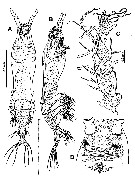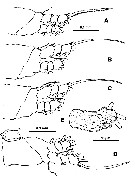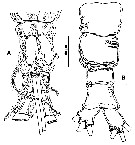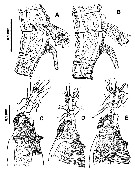|
|
 |
|
Monstrilloida ( Order ) |
|
|
|
Monstrillidae ( Family ) |
|
|
|
Cymbasoma ( Genus ) |
|
|
| |
Cymbasoma davisi Suarez-Morales & Pilz, 2008 (F) | |
| | | | | | | Ref.: | | | Suarez-Morales & Pilz, 2008 (p.528, figs.F, Rem.: p.529) |  Issued from : E. Suarez-Morales & D. Pilz in J. Mar. Biol. Ass. U.K., 2008, 88 (3). [p.528, Fig.1]. Female (from 25°44'47.8''N, 80°10'40.6''W): A, habitus (dorsal); B, same (lateral, showing length of ovigerous spine); C, right A1 (dorsal); D, cephalic area (showing ventral surface with cuticular processes)
|
 ssued from : E. Suarez-Morales & D. Pilz in J. Mar. Biol. Ass. U.K., 2008, 88 (3). [p.529, Fig.2]. Female: A, P1; B, P2; C, P3; D, P4; E, P5 (showing distally arising inner lobe and outer lobe). Most swimming setae cut short, including those on P5.
|
 ssued from : E. Suarez-Morales & D. Pilz in J. Mar. Biol. Ass. U.K., 2008, 88 (3). [p.529]. Female : Armature of swimming legs P1 to P4.
|
 ssued from : E. Suarez-Morales & D. Pilz in J. Mar. Biol. Ass. U.K., 2008, 88 (3). [p.529, Fig.3]. Female: A, urosome, including 5th pedigerous, genital, and anal somites (showing P5 with complete setae, ventral view); B, same (dorsal, showing cuticular ornamentation).
|
 ssued from : E. Suarez-Morales & D. Pilz in J. Mar. Biol. Ass. U.K., 2008, 88 (3). [p.530, Fig.4]. Female: A, 5th pedigerous somite with P5 and genital somite (lateral); B, variant form of same (showing different cuticular ornamentation and much less pronounced anterior ventral process of genital somite); C, first variant form of head shape and striations, partype specimen (lateral); D, 2nd variant form, paratype specimen (lateral); E, main form (lateral).
| | | | | NZ: | 1 | | |
|
Distribution map of Cymbasoma davisi by geographical zones
|
| | | | Loc: | | | NW Atlant. (Miami, Florida) | | | | N: | 1 | | | | Lg.: | | | (994) F: 1,76-1,81; {F: 1,76-1,81} | | | | Rem.: | coastal area.Cymbasoma on the basis of the caudal rami armed having 3 setae and the presence of 3 urosomites (5th pediderous, genital double-somite and anal).
By following the key published by Isaac (1975), this species would be identified as Cymbasoma rigidum. Based on Suarez-Morales (2006) analysis of the morphological variability of the many records attributed to this species worldwide, C. rigidum appears to comprise an assemblage of different species
C. davisi shares many important characters with C. rigidum and with C. germanicum and is thus deemed another member of this complex. The morphology of P5 was considered by Suarez-Morales (2006) as being one ogf the most important features used in the taxonomic identification and characterization of members of this presumed species complex.
Another variable character of P5 is the relative length of the inner terminal seta of the outer lobe; it can be nearly as long as the other setae, as in C. germanicum (Timm, 1896) and in reports of C. rigidum by Bourne (1890) and T. Scott (1904). A relatively short inner seta, about half the length of the other two setae, is present in C. davisi and also in specimens of C. rigidum reported by Sars (1921),
Wilson (1932), Sekiguchi (1982) and Bernier & al. (2002).
The A1 of C. germanicum (Thompson, 1888; Suarez-Morales, 2006) are relatively longer (27% of total length) than in C. davisi (16%), the latter being withi the range of most C. rigidum depicted in the literature (14-18%). | | | Last update : 20/04/2015 | |
|
|
 Any use of this site for a publication will be mentioned with the following reference : Any use of this site for a publication will be mentioned with the following reference :
Razouls C., Desreumaux N., Kouwenberg J. and de Bovée F., 2005-2026. - Biodiversity of Marine Planktonic Copepods (morphology, geographical distribution and biological data). Sorbonne University, CNRS. Available at http://copepodes.obs-banyuls.fr/en [Accessed January 08, 2026] © copyright 2005-2026 Sorbonne University, CNRS
|
|
 |
 |







